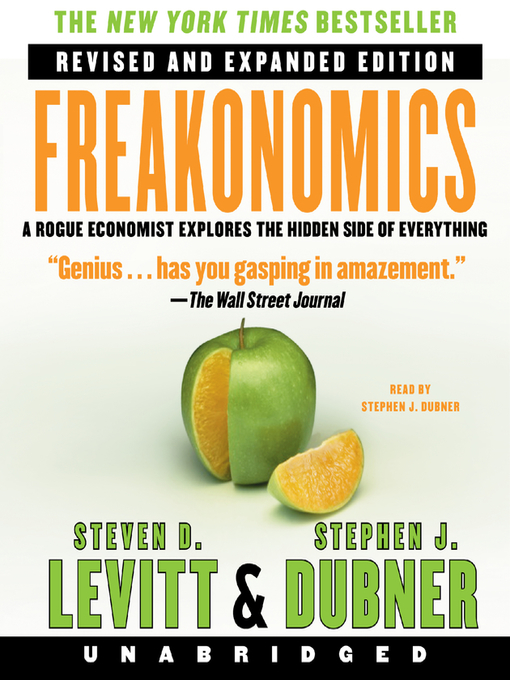Steven D. Levitt and Stephen J. Dubner offer the long-awaited paperback edition of Freakonomics, the runaway bestseller, including six Freakonomics columns from the New York Times Magazine and a Q & A with the authors.
Freakonomics Revised and Expanded
A Rogue Economist Explores the Hidden Side of Everything
-
Creators
-
Publisher
-
Awards
-
Release date
July 10, 2007 -
Formats
-
OverDrive Listen audiobook
- ISBN: 9780061254680
- File size: 226109 KB
- Duration: 07:51:03
-
-
Languages
- English
-
Levels
- ATOS Level: 9.2
- Interest Level: 9-12(UG)
- Text Difficulty: 8
-
Reviews
-
Publisher's Weekly
Starred review from March 14, 2005
Forget your image of an economist as a crusty professor worried about fluctuating interest rates: Levitt focuses his attention on more intimate real-world issues, like whether reading to your baby will make her a better student. Recognition by fellow economists as one of the best young minds in his field led to a profile in the New York Times
, written by Dubner, and that original article serves as a broad outline for an expanded look at Levitt's search for the hidden incentives behind all sorts of behavior. There isn't really a grand theory of everything here, except perhaps the suggestion that self-styled experts have a vested interest in promoting conventional wisdom even when it's wrong. Instead, Dubner and Levitt deconstruct everything from the organizational structure of drug-dealing gangs to baby-naming patterns. While some chapters might seem frivolous, others touch on more serious issues, including a detailed look at Levitt's controversial linkage between the legalization of abortion and a reduced crime rate two decades later. Underlying all these research subjects is a belief that complex phenomena can be understood if we find the right perspective. Levitt has a knack for making that principle relevant to our daily lives, which could make this book a hit. Malcolm Gladwell blurbs that Levitt "has the most interesting mind in America," an invitation Gladwell's own substantial fan base will find hard to resist. 50-city radio campaign. -
Library Journal
May 1, 2005
While drug dealers, violent criminals, and the Ku Klux Klan may be outside the purview of most economists, they fit quite comfortably into Levitt's world. The University of Chicago professor and Clark Medal winner (awarded to promising economists under 40) presents the commonplace and examines it more closely. Levitt cleverly shows us that schoolteachers and sumo wrestlers have more in common than we think (both have been shown to cheat in various ways to further their interests). And he demonstrates how groups trusted by their constituents, like realtors and even the Ku Klux Klan, take advantage of information asymmetry to manipulate their respective "markets." This is also your best chance to wrestle with such metaphysical questions as why drug dealers still live with their mothers. Levitt has kindly forewarned us that there is no unifying theme behind his thought -he just sees things differently from his peers. Levitt's analysis and Dubner's ("Turbulent Souls"; "Confessions of a Hero-Worshipper") fluid prose make this foray into freakonomics a recommended addition to public and academic library economics collections. [See Prepub Alert, "LJ" 1/05.] -Carol J. Elsen, Univ. of Wisconsin, WhitewaterCopyright 2005 Library Journal, LLC Used with permission.
-
Library Journal
-
Booklist
May 15, 2005
Award-winning economist Levitt and journalist Dubner join forces to strip a layer or two from the surface of modern life and see what is happening underneath. The authors' worldview as they explore the hidden side of many issues is based on a few fundamentals--among them, incentives are the cornerstone of modern life, and conventional wisdom is often wrong. They look at many different scenarios in a treasure-hunt approach, employing the best economic analytical tools but also following any freakish curiosities that they encounter--hence the study of Freakonomics. They evaluate intriguing questions such as "What do Schoolteachers and Sumo Wrestlers Have in Common?" "How is the Ku Klux Klan Like a Group of Real Estate Agents?" "Where Have All the Criminals Gone?" and "What Makes a Perfect Parent?" We are counseled to think sensibly about how people behave in the real world and to ask a lot of questions. This excellent, readable book will enlighten many library patrons.(Reprinted with permission of Booklist, copyright 2005, American Library Association.) -
Publisher's Weekly
June 6, 2005
Though the idea of listening to an economics text may bring to mind nightmarish visions of incomprehensible facts, figures and graphs, this audiobook is refreshingly accessible and engrossing. Journalist Dubner reads with just the right mix of enthusiasm and awe, revealing juicy morsels of wisdom on everything from what sumo wrestlers and teachers have in common (a propensity to cheat) to whether parents can really push their kids to greatness by buying them Baby Einstein toys and enlisting them in numerous before- and after-school activities (not really). The only section that doesn't translate well to the format is the final one on naming conventions. The lists of "White Girl Names" and "Black Girl Names," and "Low-End" names and "High-End" names can be mind-numbing, though the text that breaks up these lists will intrigue. Overall, however, these unusual investigations by Levitt, the "rogue" of the subtitle, make for meaty—and entertaining—listening. Simultaneous release with the Morrow hardcover (Reviews, Mar. 14).
-
Formats
- OverDrive Listen audiobook
subjects
Languages
- English
Levels
- ATOS Level:9.2
- Interest Level:9-12(UG)
- Text Difficulty:8
Loading
Why is availability limited?
×Availability can change throughout the month based on the library's budget. You can still place a hold on the title, and your hold will be automatically filled as soon as the title is available again.
The Kindle Book format for this title is not supported on:
×Read-along ebook
×The OverDrive Read format of this ebook has professional narration that plays while you read in your browser. Learn more here.



